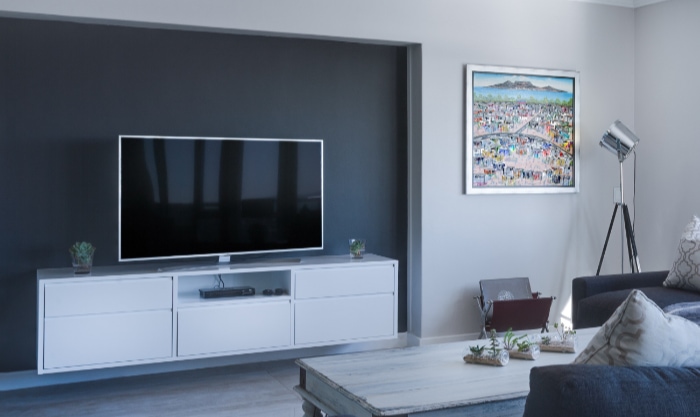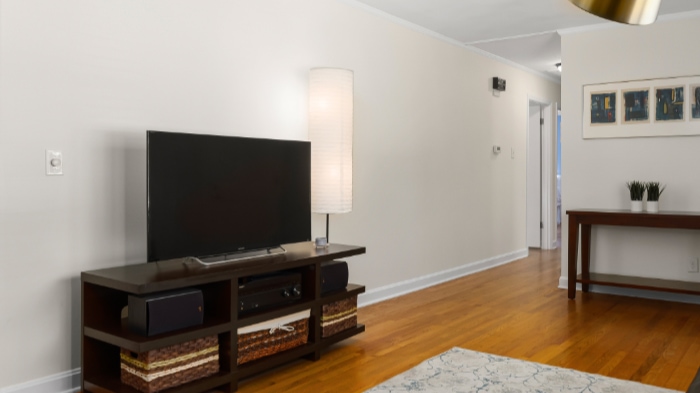How Long Do Samsung TVs Last? What You Can Expect

Samsung has established itself as a leading TV manufacturer, offering a diverse range of televisions that cater to various needs and budgets. With the constant advancements in technology, consumers are often concerned with the lifespan of their TVs, as it is a significant factor in their purchasing decision.
Understanding the longevity of Samsung TVs can help you make an informed choice and ensure that you get the most value out of your investment. In this comprehensive guide, we will explore the various factors that affect the lifespan of Samsung TVs, their average longevity, and how to extend their life.
Factors Affecting Samsung TV Lifespan
Understanding the factors that impact the lifespan of a Samsung TV can help you make the most of your investment. These factors range from build quality to usage patterns and maintenance.
Internal Components
The longevity of a Samsung TV is greatly influenced by the quality of its internal components, such as the power supply, capacitors, processors, and display panel. Samsung is known for using high-quality components, which contributes to the durability and extended lifespan of their TVs.
External Build
The external build of a Samsung TV, including the frame, bezel, and stand, also plays a role in its overall lifespan. Samsung TVs typically feature robust designs and materials, ensuring that the TV can withstand regular usage and resist wear and tear over time.
Daily Hours of Usage
The number of hours a Samsung TV is used per day can impact its lifespan. Consistently using your TV for extended periods can cause the internal components to wear out faster. It is essential to give your TV adequate rest periods to prolong its life.
Environmental Factors
Environmental factors such as temperature, humidity, and dust can also affect the longevity of a Samsung TV. Excessive heat, moisture, and dust accumulation can cause damage to internal components, leading to a reduced lifespan. It’s crucial to maintain optimal environmental conditions for your TV to ensure its longevity.
Cleaning and Dusting
Regular cleaning and dusting of your Samsung TV can help extend its life. Dust can accumulate on the screen and vents, causing overheating and damage to internal components. Make sure to clean your TV gently using a microfiber cloth and avoid using harsh chemicals that could damage the screen.
Proper Ventilation
Ensuring proper ventilation for your Samsung TV is vital for its lifespan. Inadequate ventilation can cause the TV to overheat, resulting in damage to internal components and a reduced lifespan. Keep the area around the TV clear and avoid placing it in enclosed spaces or close to heat sources.
Average Lifespan of Samsung TVs
The average lifespan of Samsung TVs varies depending on the model and technology used. Comparing the longevity of different types of Samsung TVs can help you determine which one best suits your needs.
Standard LCD/LED TVs
Samsung’s standard LCD and LED TVs are known for their durability and longevity. With proper usage and care, these TVs can last for an average of 7 to 10 years. The exact lifespan may vary depending on individual usage patterns, environmental factors, and maintenance practices.
QLED TVs
Samsung’s QLED TVs, featuring Quantum Dot technology, offer enhanced picture quality and an extended lifespan compared to traditional LCD/LED TVs. The average lifespan of a QLED TV is estimated to be between 10 and 15 years.
The advanced technology and high-quality components used in QLED TVs contribute to their longer life expectancy.
OLED TVs
OLED technology generally has a shorter lifespan compared to LCD/LED and QLED TVs. OLED TVs are more susceptible to issues like burn-in and image retention, which can reduce their overall lifespan.
Comparisons with Other Leading Brands
Samsung TVs are known for their longevity and durability, often outperforming other leading TV brands in terms of lifespan. While individual experiences may vary, Samsung TVs are generally considered reliable and long-lasting, making them a solid investment for consumers seeking a dependable television.
How to Extend the Life of Your Samsung TV

Taking proactive steps to extend the life of your Samsung TV can save you money and ensure a better viewing experience. Follow these practical tips to prolong your TV’s lifespan.
Adjusting Brightness and Contrast Levels
Prolonged use of high brightness and contrast levels can lead to increased wear on your Samsung TV’s components.
To extend its lifespan, consider adjusting the brightness and contrast settings to more moderate levels, especially during extended viewing sessions. This can help reduce strain on the internal components and prevent potential screen issues.
Using Power-Saving Features
Samsung TVs often come with built-in power-saving features that can help extend the life of your TV. By enabling these settings, you can reduce energy consumption, lower heat generation, and minimize wear on internal components.
Consult your TV’s user manual to learn more about the available power-saving options and how to enable them.
Turn off the TV When Not in Use
To minimize wear and tear on your Samsung TV, remember to turn it off when it’s not in use. This practice helps reduce the strain on internal components and prevents unnecessary energy consumption.
Use a Surge Protector
Electrical surges can damage your TV’s internal components, shortening its lifespan. Protect your Samsung TV by connecting it to a surge protector, which can help absorb power spikes and keep your TV safe.
Regular Maintenance
Conduct regular inspections of your Samsung TV to identify any potential issues, such as loose cables or damaged connections. Addressing these problems early can help prevent more significant issues that could affect your TV’s lifespan.
Avoid Direct Sunlight
Prolonged exposure to direct sunlight can cause your Samsung TV’s screen to fade and its internal components to overheat. Position your TV away from direct sunlight to maintain its optimal performance and prolong its life.
Control Room Temperature and Humidity
Extreme temperatures and high humidity levels can affect your TV’s internal components, reducing its lifespan. Maintain a comfortable room temperature and use a dehumidifier if necessary to protect your Samsung TV from environmental stress.
Firmware Updates
Regularly updating your Samsung TV’s firmware ensures that it runs on the latest software, which can help improve performance, fix bugs, and enhance security. By keeping your TV up-to-date, you can ensure that it continues to function optimally and extend its overall lifespan.
How to Update Samsung TV Firmware
Samsung TVs typically offer automatic firmware updates. However, you can also manually check for updates by navigating to the TV’s settings menu and selecting the software update option.
Ensure that your TV is connected to the internet to download and install the latest firmware updates. Consult your TV’s user manual for detailed instructions on updating the firmware.
Signs That It’s Time to Replace Your Samsung TV

Knowing when it’s time to replace your Samsung TV is crucial for maintaining a satisfying viewing experience. Watch for these common signs that indicate it may be time for an upgrade.
Dead Pixels
Dead pixels are small dots on your TV screen that don’t change color or respond to input. A few dead pixels might not significantly impact your viewing experience, but if the number of dead pixels continues to grow or they become clustered in a specific area, it might be time to consider replacing your Samsung TV.
Burn-in or Image Retention
Burn-in occurs when static images are displayed on a TV screen for an extended period, resulting in permanent damage to the display. Image retention is a temporary version of burn-in, where an image remains visible on the screen even after it has been removed.
If your Samsung TV starts showing signs of burn-in or persistent image retention, it may be time to look for a replacement.
Audio Problems
Distorted or inconsistent audio can detract from your viewing experience and may indicate that your Samsung TV is nearing the end of its lifespan. If you’ve ruled out external factors such as damaged cables or external speakers and the audio issues persist, it might be time to consider a new TV.
Performance and Connectivity Issues
Over time, your Samsung TV may begin to experience performance issues such as slow navigation through menus, freezing, or frequent crashing.
Additionally, if your TV’s connectivity options become outdated and no longer support your devices or streaming services, it may be time to upgrade to a newer model with updated technology.
Obsolete Technology and Features
As technology advances, older TVs may not support newer features or formats, such as higher resolution content, HDR, or advanced audio codecs. If your Samsung TV is no longer compatible with your preferred media sources or lacks essential features that would significantly enhance your viewing experience, it may be time to invest in a new TV.
Warranty and Support for Samsung TVs
Being aware of Samsung’s warranty and support offerings can give you peace of mind and help you protect your investment. Learn about the standard warranty, extended options, and customer support services.
Samsung’s Standard Warranty Coverage
Samsung provides a standard limited warranty for its TVs, which typically covers parts and labor for a period of 1 year from the date of purchase. This warranty covers manufacturing defects and does not include damage caused by improper use, accidents, or wear and tear.
It is essential to review the specific warranty terms and conditions for your Samsung TV model to understand the coverage and exclusions fully.
Extended Warranty Options
Some retailers and third-party providers offer extended warranty options for Samsung TVs, which can provide additional coverage beyond the standard 1-year warranty.
Extended warranties may cover a longer period, additional types of damage, or even offer benefits such as in-home service or replacement guarantees. When considering an extended warranty, it is crucial to read the terms and conditions to understand the coverage, limitations, and cost.
Support and Customer Service
Samsung is known for its comprehensive customer support, which includes online resources, phone support, and authorized service centers. Samsung’s online support offers troubleshooting guides, user manuals, and software updates to help you address common issues and maintain your TV.
If you require additional assistance, you can contact Samsung’s customer service hotline, where representatives can help diagnose problems and guide you through the process of obtaining repairs or replacements under warranty.
Additionally, Samsung’s network of authorized service centers can provide professional repair services for your TV, ensuring it remains in optimal condition throughout its lifespan.
Conclusion
The lifespan of a Samsung TV depends on several factors, including build quality, usage patterns, environmental conditions, and proper maintenance. Samsung TVs are known for their durability and longevity, often outperforming other leading TV brands. With proper care and attention, your Samsung TV can provide you with many years of enjoyable viewing experience.
It is essential to follow best practices for maintaining your TV, such as ensuring proper ventilation, keeping the screen and vents clean, and regularly updating the firmware. Recognizing the signs that it’s time to replace your TV, such as persistent screen issues, audio problems, or obsolete technology, will help you make an informed decision on when to invest in a new television.
Lastly, understanding Samsung’s warranty and support offerings can give you peace of mind and ensure that your investment is protected. By keeping these factors in mind, you can maximize the life of your Samsung TV and enjoy its benefits for years to come.



